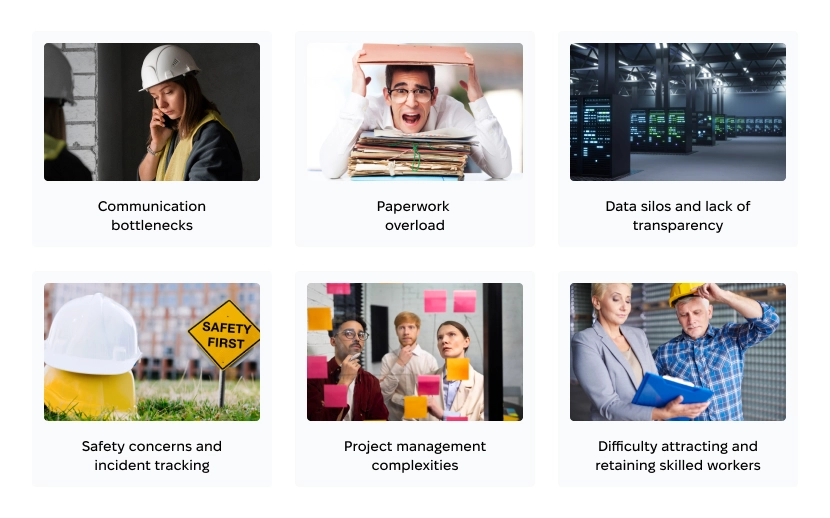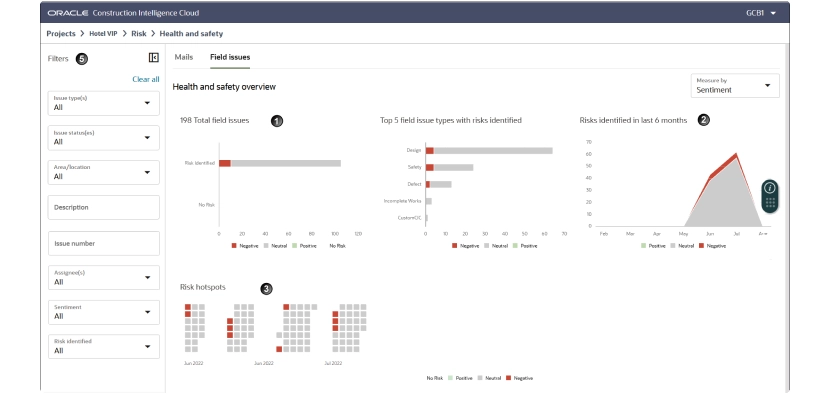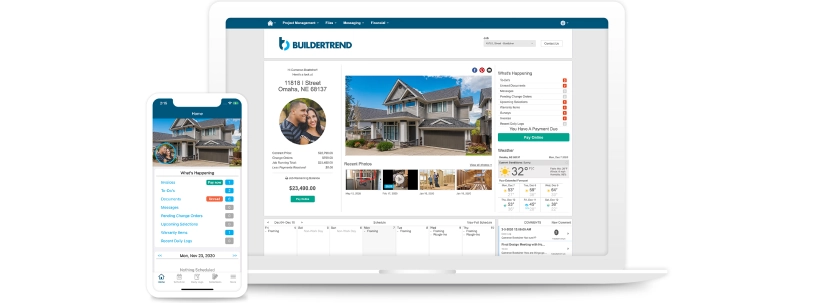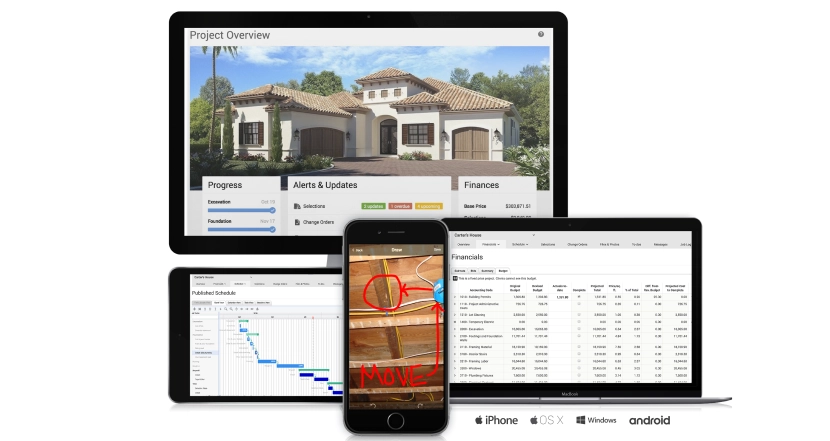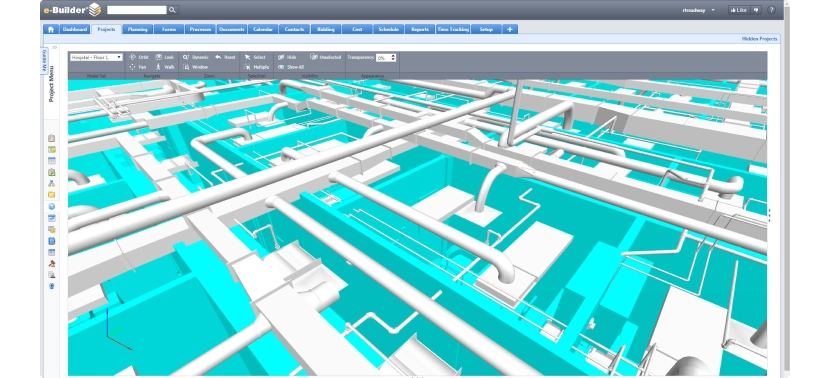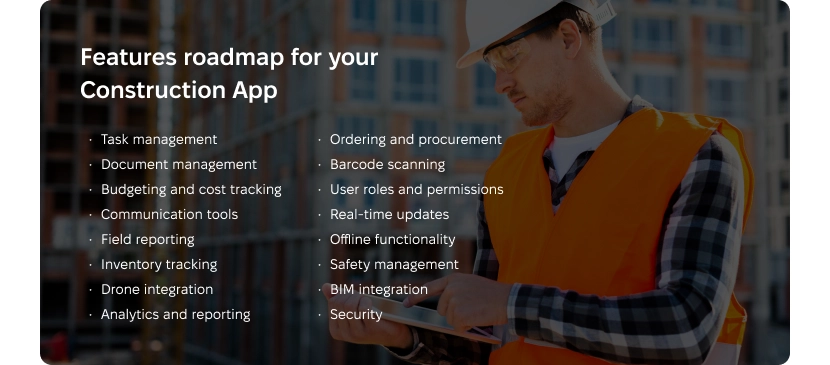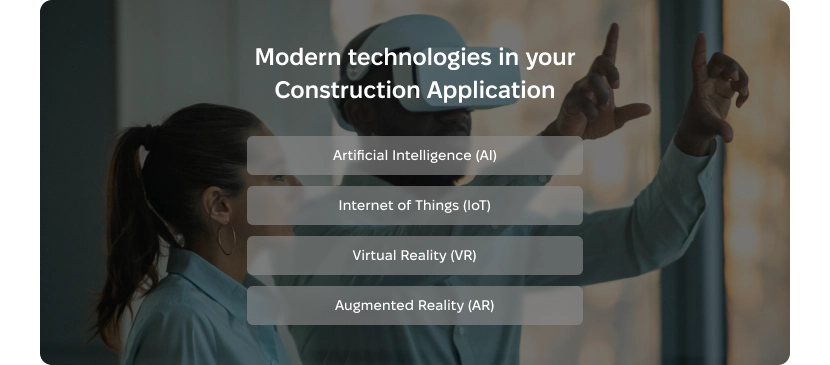Construction businesses are embracing digital technologies to improve communication between different units, cut paperwork, enhance worker safety, and store maintenance and inspection records in one place. Some ready-made solutions, like Aconex, Buildertrend, CoConstruct, and e-Builder, do the trick. Alternatively, you can develop a custom construction app featuring task management tools, digital signatures, cost trackers, barcode scanners, and data analytics. Сonstruction apps can integrate with any existing solution in your corporate toolkit, from CRM and PM software to procurement platforms. How? Learn about all aspects of construction app development and integration in our blog post.
Building a construction app enhances project management, streamlines communication between teams on job sites and back offices, and makes cost estimation more accurate. The global construction market is to reach $22.9 trillion by 2026, driving a surge in demand for construction app development. Therefore, construction apps become imperative for optimizing processes and capitalizing on the expanding market opportunities.
Exoft specializes in developing custom comprehensive solutions for construction supply chain management . Our construction apps offer full visibility, increased productivity, and sustainability through automation and user-centric design. It enables construction companies to streamline communication, data processing, and productivity for optimized general project operations.
With this deep dive, we aim to empower businesses in the construction industry to develop successful apps. You will learn to address common challenges and harness construction app technologies. Explore how to enhance communication, streamline workflows, centralize data, bolster safety protocols, optimize project management, and attract and retain talent.
Why Do Construction Businesses Need to Go Digital?
Due to the industry’s complexities, construction businesses face communication bottlenecks, paperwork overload, and project management difficulties. Building a construction application can tackle these challenges by improving communication, streamlining workflows, centralizing data, enhancing safety, optimizing project management, and more, while app modernization services ensure that the app remains up-to-date and scalable as technology advances.
Construction Industry Challenges
- Communication bottlenecks. In the construction industry, communication gaps between various stakeholders can lead to delays and errors in project execution.
- Paperwork overload: Traditional paperwork processes can be burdensome and time-consuming. It leads to inefficiencies and increased administrative load.
- Data silos and lack of transparency: Without a centralized system for data management, construction businesses may struggle with fragmented information and limited visibility into project progress.
- Safety concerns and incident tracking: Safety is a paramount concern in construction. Without proper tools for incident tracking and safety protocols, business risks increase.
- Project management complexities: Construction projects involve numerous tasks, timelines, and resources. It makes project management challenging without dedicated tools for planning and coordination.
- Difficulty attracting and retaining skilled workers: There is a shortage of skilled labor in the construction industry. Without effective solutions for recruitment and retention, businesses may struggle to meet project demands.
How Construction Apps Address Industry Challenges
Building construction software apps effectively tackles industry challenges, ensuring streamlined communication, enhanced productivity, and improved project management. Such apps can serve as a comprehensive ERP for the construction industry and infrastructure , consolidating various functions.
Improve Communication and Collaboration
Mobile apps for construction facilitate real-time communication between team members. They enable instant updates, sharing of important documents, and seamless collaboration regardless of location. Thus, all stakeholders remain on the same page. It results in enhanced productivity and smoother project execution.
Streamline Workflows and Reduce Paperwork
By digitizing processes and automating tasks, construction apps streamline workflows and significantly reduce manual paperwork. This functionality saves time, minimizes the risk of errors, improves data accuracy, and boosts overall efficiency across various project stages.
Centralize Data and Improve Transparency
Construction apps act as centralized repositories for project-related information, giving all stakeholders easy access to data. This transparency fosters better decision-making, improves project oversight, and enhances accountability throughout the construction lifecycle.
Enhance Safety Measures and Incident Reporting
Through features like real-time safety alerts, digital safety checklists, and incident reporting functionalities, construction apps prioritize safety on job sites. Using the app, workers can report incidents promptly. It facilitates proactive safety measures and contributes to a safer working environment.
Optimize Project Management and Resource Allocation
Construction apps offer comprehensive project management tools that enable efficient planning, scheduling, and resource allocation. By providing insights into project progress, resource utilization, and budget tracking, these apps help project managers make informed decisions and optimize project outcomes.
Attract and Retain Talent with Improved Workplace Tools
Construction apps enhance employee experience by providing modern workplace tools and technologies. From streamlined communication channels to accessible training resources, these apps contribute to employee satisfaction and skill development. It ensures talent retention within the construction company.
Top 4 Examples of Construction Apps
When you consider developing a construction app, analyze leading solutions to understand design and feature trends. Here are some popular ready-made solutions to inspire you to build the best app for construction.
Aconex
Aconex, now part of Oracle, offers a suite of construction apps on Android and iOS platforms. These apps provide offline capabilities for field inspection and advanced security features to protect confidential data. They enable users to track construction projects remotely from job sites or elsewhere. Aconex’s solutions also facilitate communication and collaboration among project stakeholders.
Buildertrend
Buildertrend stands out for its user-friendly interface and comprehensive features covering CRM, project management, and financial tools. Available on Android and iOS, Buildertrend supports budget management, purchase orders, mobile touch signatures, daily site logs via voice-to-text, and organizing site photos. These functionalities make the app a holistic solution for construction businesses.
CoConstruct
CoConstruct’s apps facilitate project coordination and communication between builders, clients, and teams. It is available both on Android and iOS. Users can easily share files and photos and manage estimations, bidding, budgeting, forecasting, and timesheet management for streamlined project workflows from field to back office.
e-Builder
e-Builder’s construction management apps prioritize real-time communication between field and office personnel. Their features include program information management, customizable dashboards, document management, cost reporting, and workflow management. Being designed for Android and iOS, e-Builder offers a robust solution for managing the entire lifecycle of construction projects with enhanced efficiency and transparency.
Features Roadmap for Your Construction App
Incorporating a comprehensive set of features defines the success of your app construction development. Below is a roadmap outlining must-have application functionality.
Task Management
Apps for construction businesses should allow users to create, assign, and track tasks for various project activities. This functionality will make task management more efficient, ensuring accountability and timely completion.
Document Management
Centralized document management keeps project-related documents organized and accessible. Your app should enable users to securely upload, store, and share documents. It will streamline collaboration as every authorized team member can access the latest information.
Budgeting and Cost Tracking
Compelling budgeting and cost-tracking features are essential for monitoring project finances and profitability. Your app should allow users to create budgets, track expenses, manage invoices, and generate financial reports, providing transparency and control over project costs.
Communication Tools
A seamless exchange of information is vital to project coordination and collaboration. Your app should include communication tools such as messaging, notifications, and discussion forums. This way, team members, clients, and stakeholders can communicate efficiently in real time.
Field Reporting
Field reporting capabilities allow for capturing on-site information and progress updates. Your app should enable users to create and submit field reports, including photos, videos, and notes. It will facilitate efficient communication between field and office personnel.
Inventory Tracking
The inventory tracking feature helps accurately manage materials and equipment on construction sites. Your app should allow users to track inventory levels, monitor stock movements, and generate inventory reports for optimal resource allocation and minimal delays.
Ordering and Procurement
Streamlined ordering and procurement processes ensure timely delivery of materials and equipment. Your app should enable users to create purchase orders, track orders, and manage suppliers. It will simplify procurement workflows and reduce administrative overhead.
Barcode Scanning
Barcode scanning functionality enhances inventory management and asset tracking capabilities. Your app should support barcode scanning to quickly identify and track materials, equipment, and assets on construction sites for improved efficiency and accuracy.
User Roles and Permissions
Multi-level user roles and permissions are essential for controlling access to sensitive project data and functionalities. Your app should allow administrators to define user roles and assign permissions based on job responsibilities for data security and compliance.
Real-Time Updates
Real-time updates keep stakeholders informed about project progress and changes. Your app should provide real-time notifications and updates on tasks, milestones, and project status. It enables timely decision-making and proactive problem-solving.
Offline Functionality
To create a mobile app for the construction industry that can be used in remote or low-connectivity environments, offline functionality is vital. Your app should support offline access to essential features and data. This way, construction workers can continue using it without an internet connection and sync data automatically when connectivity is restored.
Safety Management
Safety management features help ensure compliance with safety regulations and minimize workplace incidents. Your app should facilitate safety inspections, hazard reporting, and safety training. It promotes a culture of safety and mitigates risks on construction sites.
Drone Integration
Drone integration enhances project monitoring and site surveying capabilities. Supporting drone integration, your app can capture aerial images and footage, conduct site surveys, and monitor construction progress. It will provide valuable insights for project planning and management.
BIM Integration
Building Information Modeling (BIM) integration enables collaborative design and construction planning. With BIM, your app can access and visualize 3D models, share design data, and coordinate construction activities. It will improve project coordination and reduce errors.
Analytics and Reporting
Analytics and reporting capabilities provide valuable insights into project performance and trends. With robust analytics and reporting features, your app users can track key metrics, generate custom reports, and gain actionable insights to optimize project outcomes.
Security
Protecting sensitive project data and maintaining user trust is paramount. Construction apps should implement industry-standard security protocols like data encryption, access controls, and regular security audits. It will ensure the confidentiality and integrity of project information.
API Integrations with Other Construction Software and Business Systems
Integrating your construction app with other software and business systems can significantly enhance functionality and streamline workflow. At Exoft, we specialize in API integrations, seamlessly connecting your construction app with a wide range of third-party solutions. Here are some examples of API integrations that can benefit your construction app.
- Project Management Software. Integrating with project management software like Asana, Trello, or Microsoft Project can centralize project data and streamline task management, ensuring better coordination and collaboration among team members.
- Accounting and Financial Management Systems. API integrations with accounting software like QuickBooks or Xero can automate invoicing, expense tracking, and payroll management. It simplifies financial management and ensures accurate record-keeping.
- CRM Systems. Integrating with Customer Relationship Management (CRM) systems like Salesforce or HubSpot can enhance customer communication and lead management. Such integrations result in better client engagement and retention.
- Building Information Modeling (BIM) Software. API integrations with BIM software like Autodesk Revit or Trimble SketchUp facilitate seamless data exchange between your construction app and BIM models. It improves design coordination and construction planning.
- Procurement Platforms. Integrating with procurement platforms such as Procore or Buildertrend can streamline the procurement process, from requesting quotes to issuing purchase orders. As a result, you get efficient supply chain management and timely materials delivery.
- Equipment and Fleet Management Systems. API integrations with equipment and fleet management systems like Fleetio or AssetWorks optimize equipment utilization and maintenance scheduling. It reduces downtime and maximizes productivity on construction sites.
- Geographic Information Systems (GIS). Integrating with GIS platforms like ArcGIS or Google Maps provides valuable spatial data insights, such as site location analysis and route optimization. It enhances project planning and decision-making.
- Document Management Systems. Integrating with document management systems such as SharePoint or Box centralizes document storage and version control. It ensures secure access to project documentation and facilitates team collaboration.
- Building Automation Systems (BAS). API integrations with BAS platforms like Honeywell or Siemens enable real-time monitoring and control of building systems. You can optimize energy efficiency and enhance occupant comfort in construction projects.
With extensive experience, Exoft seamlessly integrates APIs into construction apps, boosting project efficiency and productivity.
Modern Technologies in Your Construction Application
Incorporating modern technologies into your construction application can revolutionize how you manage projects and streamline various construction processes. Exoft implements AI, IoT, VR/AR, and other tech innovations to enhance the capabilities of your construction app.
Artificial Intelligence (AI)
Utilizing AI algorithms can automate repetitive tasks, such as data analysis, predictive modeling, and decision-making processes. AI-powered features optimize resource allocation, identify potential risks, and improve project efficiency.
Internet of Things (IoT)
Integrating IoT sensors and devices into your construction application enables real-time monitoring of construction site equipment, materials, and environmental conditions. IoT data can track inventory levels, monitor equipment performance, and enhance safety measures.
Virtual Reality (VR) and Augmented Reality (AR)
VR and AR technologies provide immersive experiences for project planning, design visualization, and virtual walkthroughs of construction sites. By incorporating VR/AR features into your application, stakeholders can visualize construction projects in 3D and identify design flaws or clashes before construction begins.
By partnering with Exoft, you harness modern technologies to create a construction application that enhances productivity, efficiency, and safety in your construction projects.
Development Approach for Construction Apps
The right approach to developing a construction app yields optimized outcomes. Here’s what you can do to build your app effectively.
Utilizing Agile Methodology
Agile methodology is ideal for construction app development projects. Agile supports iterative development, allowing for flexibility and adaptability throughout the process. This approach ensures that changes are implemented smoothly and efficiently, resulting in a more robust and user-centric application.
Adopting a Flexible Development Process
A flexible mobile app development process that incorporates the following steps:
- Create a Lean Canvas Model: Define your business model to outline customer segments, value propositions, revenue streams, and cost structure.
- Prepare a Product Requirement Document (PRD): Develop a comprehensive PRD that outlines your construction app’s features, functionalities, and specifications.
- Create Wireframes & Prototype: Visualize your construction app’s user interface and user experience.
- Select Technology Stack: When choosing the tech stack, consider scalability, performance, and compatibility with desired features and functionalities.
- Break Down the Project: Divide the project into deliverable milestones to track progress and ensure timely completion.
- Frontend and Backend Development: Initiate frontend and backend development guided by wireframes, prototypes, and PRD. Work closely with construction app developers to ensure the app’s architecture and functionality align with project needs.
- Quality Assurance and User Testing: Conduct thorough quality assurance testing to address bugs or issues and perform user testing to gather feedback.
- Receive Feedback and Iterate: Incorporate feedback from testing phases to iterate and continuously improve the construction app.
Leveraging APIs
Utilize Application Programming Interfaces (APIs) to integrate existing solutions and functionalities into your construction app. APIs provide access to pre-built functionalities, saving development time and effort. Using APIs, you can enhance your app’s capabilities and deliver a more comprehensive solution to users.
How to Optimize The Cost Of Construction App Development
Optimizing the costs of construction app development requires careful planning and strategic decision-making. Explore the initial expenses and various cost optimization aspects for efficient resource allocation and successful project outcomes.
Initial Costs
The initial cost breakdown of construction app development typically includes expenses related to hiring developers, purchasing necessary software and tools, and investing in infrastructure. Designing wireframes and prototypes, conducting market research, and creating a product requirement document (PRD) can involve extra expenses.
Factors Affecting Cost
The main factors contributing to the cost of app development include:
- The extent of app features.
- The number of APIs for GPS, camera, and storage functionalities.
- Design iterations.
- Targeted operating systems, such as iOS and Android.
- The choice between Native or Hybrid mobile app development.
- Developer hourly rates.
- Support and maintenance expenses.
Budgeting Tips
- Define a clear budget from the outset, accounting design, development, testing, and deployment.
- Prioritize features based on essential functionalities and allocate resources accordingly to avoid overspending on non-essential elements.
- Consider leveraging open-source technologies and reusable components to reduce development costs.
Exoft Case Studies
Exoft has successfully crafted tailored applications that streamline processes, enhance efficiency, and drive growth for construction businesses. Here is a success story of one of our clients, a construction supply chain management provider. They wanted to create an all-in-one platform that offered comprehensive visibility and control over the construction supply chain.
By collaborating closely with Exoft, the client’s vision became a comprehensive solution comprising a construction management tool and a suppliers’ management platform. Through iterative enhancements and leveraging cutting-edge technologies, Exoft ensured the project’s success. The solution had a transformative impact, facilitating over 20,000 deliveries and 3,500 resource bookings, enhancing productivity, sustainability, and customer-centricity.
Optimize Your Construction Projects with Exoft
Construction apps become imperative for addressing the industry’s challenges by optimizing communication, paperwork, and project management. Such solutions enhance collaboration among team members, improve workflow efficiency, and provide accurate cost estimation. Using this deep dive, you can use construction apps to capitalize on the expanding construction market opportunities.
Exoft brings unparalleled expertise to developing construction and logistics management apps , backed by a proven track record. With a deep understanding of the construction industry’s challenges, we offer innovative solutions that enhance efficiency, productivity, and profitability. Choose Exoft as your partner for advanced technology and collaborative development of revolutionary construction app solutions.
Contact us to discuss your construction app requirements and get an estimate.
